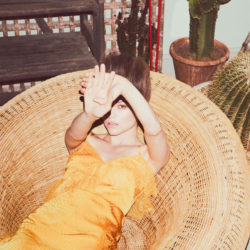Charlize Theron is called intimidating, and for good reason
INTERVIEW MICHELE MANELIS ILLUSTRATION TOM MORGAN-JONES

It’s difficult to reconcile the elegance and beauty of Oscar-winning movie star and glamorous Dior spokesmodel Charlize Theron, the irreverent woman sitting in front of me whose speech is peppered with colorful expletives. In fact, when listening to Theron speak, it’s easy to forget she hails from South Africa and that Afrikaans was her first language.
There’s no mystery about why Theron is often described as intimidating. Without question, the choices of roles she’s taken on in movies, such as The Huntsman: Winter’s War, Mad Max: Fury Road, and more recently, Atomic Blonde have contributed to that ice-queen image. However, since becoming a mom, she’s revealed her lighter comedic side, as evidenced in last year’s Tully, and, more recently, Long Shot.
As a single mother of two adopted African American children, Theron recently announced that her eldest, seven-year-old Jackson, identifies as a girl rather than the gender assigned at birth. Theron has adjusted to the idea of raising two daughters, as opposed to one of each sex, with her typical no-fuss attitude.
VM: You’re usually referred to as strong and fearless. To what do you attribute that to?
CT: I think having a very close relationship with my mom was a real blessing. To have that mom be my mom was the cherry on the cake because she’s just an incredible woman. And so for me, as a young girl, I had this great representation of what you could be as a woman. I never had fears or thought I couldn’t do something because of it.
VM: You’ve refused to be boxed in by your beauty. Was that always important to you?
CT: I wasn’t particularly gorgeous when I was a kid. I had jaundice as a baby and the antibiotics rotted my teeth. When my teeth came in, they had to pull them out, which meant that until I was 10 or 11, I didn’t have any teeth. So I never grew up thinking that I was anything extraordinary in that sense. And my mom always adopted this kind of behavior towards me that it was more important what my actions were, versus what I looked like. When I was 16, I won a modeling contest. I felt that it wasn’t a natural fit for me because I don’t think I’d ever really felt that way. But now, I have a healthier understanding of myself. I’m loving myself now more than I did then, which is normal because I don’t think we know how to love ourselves when we’re young girls.
VM: People who know you are aware you have a dry sense of humor. That must get you in trouble.
CT: I say very inappropriate things all the time. I swear a lot and can be fucking filthy. I’m trying to change that because my kids will start picking up on it. I am very lucky to be surrounded by a lot of great women who are very close to me and who have always encouraged me to be me. I think now that I’m in my forties I’m more grateful for them, because I realize decades-long relationships only happen when somebody ultimately gets you and appreciates you for that. I might have become a much more watered-down person if I didn’t have my mom in my life or the girlfriends that I’ve had. All of them are so fucking feisty that it’s impossible for me not to celebrate that part of myself.
VM: You adopted two children from America; were you ever tempted to adopt closer to your South African roots?
CT: My belief is that babies choose you more than you choose them. And so, when I knew I wanted to be a mom, I thought, “Let it be.” I looked everywhere, South Africa included, but they are not very forgiving to single moms, though our constitution in South Africa is very supportive of gay couples. I did cast a very wide net, but my children just happen to come from America.
VM: In this sociopolitical climate where there are so many LGBT issues, how do you prepare your kids for the world?
CT: What’s happening right now in our administration and what’s happening to human rights, especially for the transgender community, is something that for me personally is very upsetting. My kids are very little right now, and like any parent I just want to protect them. I want them to thrive in this country because this is where we live. Eventually all of those things are going to come into play for them because they are going to become aware. My oldest, she’s already a little aware. But I watch that she enjoys this moment in her life where she gets to find herself and who she wants to be. For both my kids, that’s not for me to decide. They are born who they are.
VM: You’ve played so many diverse roles, from your Oscar-winning role as a serial killer in Monster (2003) to your most recent turn as Secretary of State in Long Shot (2019). What stories do you feel most connected to these days?
CT: Actually, I feel very much connected to other mothers’ stories. I think when you choose to become a mom, if you’re fortunate enough and you have that luxury — which every woman should have, by the way — then it’s a real joy. If I had to do everything that I do now for my kids when I was in my twenties, I probably would resent them. I’m just being totally blunt, because it’s a lot of work. But now, I’m in this part of my life where that’s exactly what I want.
VM: You’ve been outspoken on the topic of AIDS, especially in Africa, where the situation is still dire. Tell us how the Charlize Theron Africa Outreach Project came about.
CT: I think South Africa was buckled to its knees by this epidemic. I remember being a teenager and seeing people on our farm dying and nobody knowing why. These hushed fearful conversations in people’s homes, talking about this thing that nobody could understand or explain. I’ve met too many people in my own country who have died unnecessarily from something that is 100% preventable. That sparked the initiative behind the Charlize Theron Africa Outreach Project. The thought behind it was that if you have a bunch of kids who are healthy, then why don’t we invest in trying to keep them healthy? It’s been over 10 years now that the CTAOP was formed and we work all over South Africa. We help grassroots organizations who live within the communities that are the hardest hit to really bring change within their own communities.
VM: Moving on to something lighter, I’ve always the loved the J’Adore commercials. What does your association with Dior mean to you?
CT: I just realized that my association with Dior has been 18 years. That’s insane! I absolutely love that relationship. It’s brought something to my life as a woman, actress, and mother that I don’t think I knew when I signed with the house. It has become something that feels integral to my life and to my world.
VM: People talk about how intimidating you are, and I assume men especially must get a little nervous around you.
CT: I have definitely in my life, but not recently, had that feeling of having to make myself a little bit less in order to be comfortable within a relationship. And then I grew up and said, “Fuck that!” I would rather be single than resent somebody for not letting me be who I know I am.
VM: Have you ever been starstruck?
CT: Oh yeah! I feel like the soundtrack to my life has been every song that Tom Petty and the Heartbreakers ever wrote. I’m a complete Tom Petty nerd fan, and whenever he would come into town my friends would get me tickets. One year, and I don’t know how they did it, but they got him to come to my birthday party. It was really one of the coolest things that has ever happened. I couldn’t look at him! Obviously, I’m super sad by his leaving us, but what a mark he left. The way he writes about women — “American Girl” and all of those classic American songs are always about girls who go against the grain. I think he really nurtured the rebellious streak inside me a little bit.


